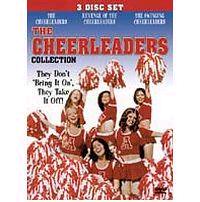
(Germany, 1973, 85 min.)
Starring Elisabeth Volkmann, Alexander Grill, Marie Ekorre, Rinaldo Talamonti, Raoul Retzer, Dorothea Rau, Maja Hoppe, Elisabeth Felchner, Jürgen Schilling, Juliane Rom-Sock (as Juliane Rom), Walter Klinger, Ulrich Beiger, Werner Röglin, Erich Kleiber.
Written by Florian Burg.
Directed by Sigi Rothemund (as Siggi Götz).
Okay, something is clearly going on. My previous review for Doris Wishman’s Nude on the Moon set me off on the ridiculous ease with which kids can access porn these days, and I was all set to begin this review by going on about how the stereotype of sex of all stripes being the most reliable pastime in rural areas, whether true or not, could be a thing of the past what with the ubiquity of all these goddamn media devices. I don’t know what it is, but, not to be crass (he said closing the barn door), the day when softcore smut becomes more likely to rile my inner crank than my outer is not a milestone I’m eager to mark.
But there’ll be plenty of time to get back to padding the review later. And speaking of barn doors, the reason I started down that path in the first place is at least relevant, given that the film at hand takes place in a mountain farm community, and as it’s set closer to the time that wireless meant an actual radio than the one where it means a douchebag forcing me to listen to his conversation, the denizens of the town are shown enjoying the traditional pastime, as they would put it, bumsen. And given the degree to which it fuels their actions, they should find a way to liquefy it and put it in their gas tanks.
The plot involves a group of local farmers, one of whom is determined to buy a piece of property that has been inherited by Gisela Horn (Volkmann), a woman from the city who exists in a perpetual state of shock at the sexual appetites of the farm folk. And the livestock, for that matter. But the farmers reason that she’s not going to sell as long as the place is profitable, and the place is unlikely to stop being profitable while the hardworking farmhands continue to work there, and they’re unlikely to quit so long as milkmaid Cherry (yummy Ekkore) is still around, what with her allergy to underwear. Cherry actually only seems to be involved with one of the farmhands, Toni (Schilling), but the farmers’ logic is their own, and it extends to the idea that the only way they’re going to get her out of there is to hire an Italian to seduce her. Through sheer brute force of coincidence a horny Italian, Vittorio (Talamonti), has just arrived in town. He’s there under the pretense of being a guardian for two daughters of a wealthy count, a gig he secured by leading the man to believe he was gay and therefore wouldn’t make any attempts to sully his daughters. This leads to all sorts of mincing and pursed lips, two things no sex farce should be without, except the good ones.
Meanwhile, Toni gets all hot and bothered with Gisela’s reference to his “churning-stick” and decides he wants to schtup her, but Cherry finds a way to sabotage his efforts. Local girl Rosie also wants to schtup Toni so she tries to sneak into his room and gets into a naked tussle with Cherry. Pig slopper Josef wants to schtup Rosie so he sneaks into her house at night and ends up sleeping with her mother, a fact to which he never gloms on. And head farmhand Hias, approached by the scheming farmers, agrees to help them schtup Gisela out of the farm, which makes a nice break from eating the rancid food at the local inn.
There’s a lot of pretty familiar stuff here: wacky hi-jinx, cute girls, constant lame-brained entendre, an insidious plot for the “good guys” to foil, the type of komedic mix-ups you wouldn’t think even remotely possible assuming the people involved have even the barest of cognitive functions, etc. Taking place in a different culture gives it a slight edge of uniqueness (at least to the degree the anglicized dubbing allows; I refuse to believe that a genuine German wrote the line, “You put one finger in Cherry and I’ll turn you into sauerkraut!”), as does the pastoral locale given the tendency to set these things in schools or maybe it’s just tempting to think so since it doesn’t insult the very idea of education by juxtaposing it with such incredible dumbness, and this, ladies and gentlemen, is a dumb one. Dear Lord, it’s dumb. It is, however, very egalitarian in as much as every single character is dumb in one way or another, regardless of social station.
Controversial psychoanalyst Wilhelm Reich theorized, to boil it down, that a society that is permitted to express and enjoy its sexuality freely would be a much healthier society politically as well. Adorable, right? But I’ve come to the conclusion that there’s actually a lot of truth to that. I mean, I don’t see acknowledgement of that solving the problems of the world (nor do I see any such acknowledgement forthcoming), but in terms of causality, it’s a bullseye. So many of society’s problems are the byproduct of emotional immaturity, much of it sexual. If mankind had spent more time learning to be rational about our natural urges instead of pretending they were evil spirits trying to corrupt us on some metaphysical level, perhaps we’d be more self-aware and subsequently less prone to sniffing those who don’t want to be sniffed by us as a way of avoiding our own neurotic shit. Maybe certain people wouldn’t feel such self-loathing and wouldn’t subsequently externalize that anger in so many different destructive ways, including doing everything possible to keep down the people who inspire those naughty feelings in them or whose own honesty makes them uncomfortable. Maybe we’d be in a much better place by now, instead of wedged between those same old paranoid fruitcakes on one side and the hypersexual backlash on the other. Ah, but what does all this have to do with Love, Bavarian Style?
Nothing, really. I told you, it’s dumb as scheibenkleisse. Plus, Reich was Austrian.









